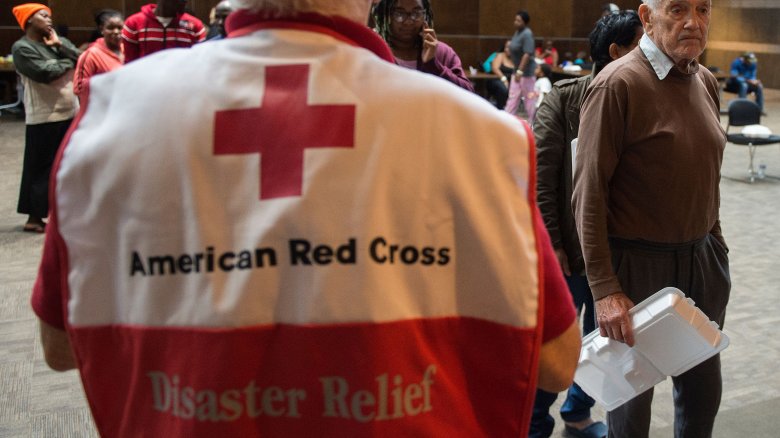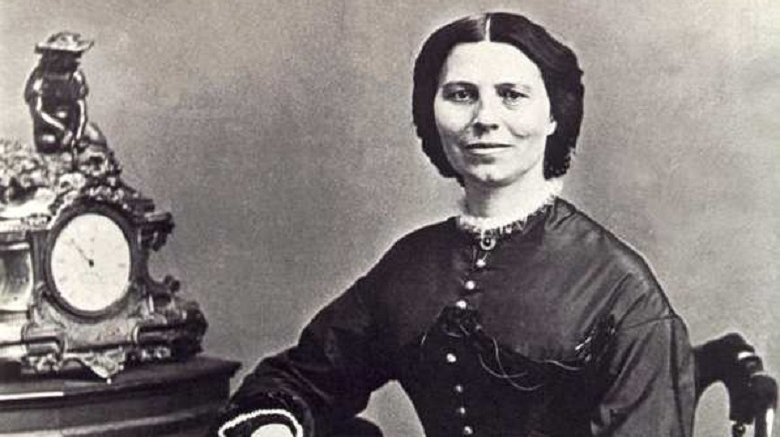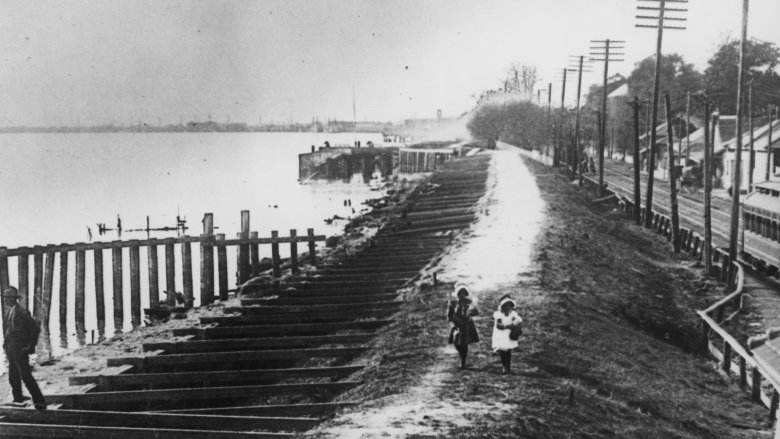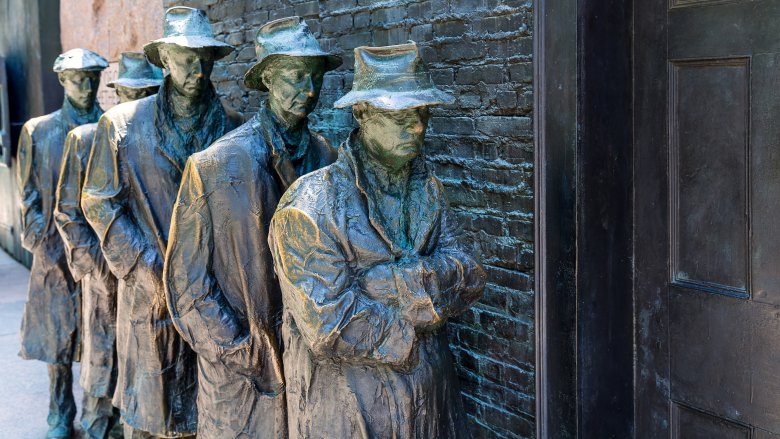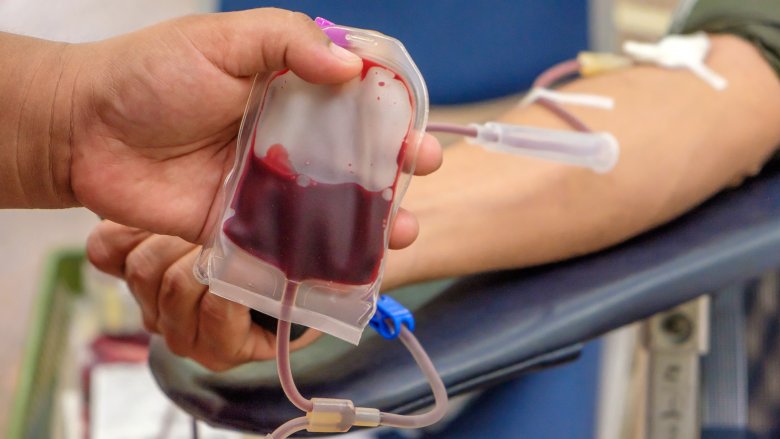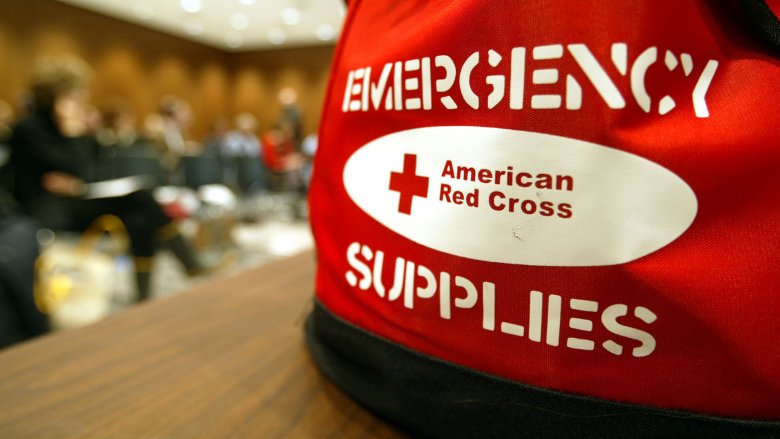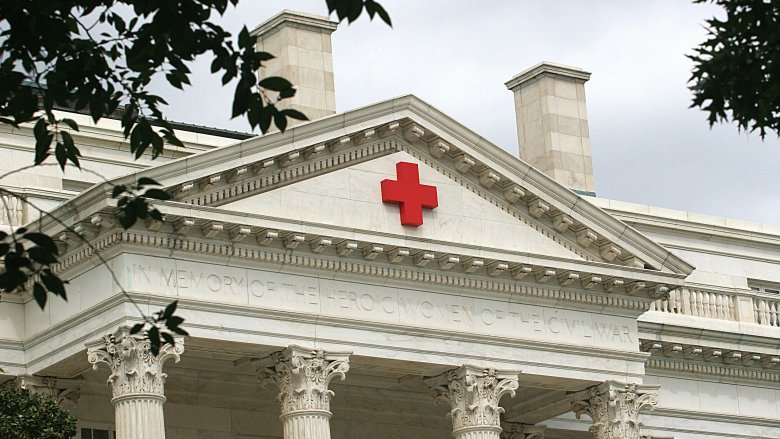The Untold Truth Of The American Red Cross
The American Red Cross is an institution. It's one of the biggest charities in the country, raking in billions every year. After any disaster you see people sharing links all over social media, begging others to donate to the Red Cross so they can get out there and help those affected.
But the organization has a dark underbelly. Its history is full of scandal and bigotry. It flat-out refused to help during one of the biggest disasters America ever faced. In the modern era, Red Cross assistance during emergencies has been called into question time and again, by everyone from watchdog groups, to politicians, to the people they were supposed to help, to their own volunteers. There are also serious questions about what exactly they do with donations, and why their employees steal them all the damn time.
This list just might convince you that after the next disaster, your precious dollars would be better off with a different charity.
It started out as an inefficient, scandal-ridden cult of personality
Clara Barton was a celebrity in her own time. She was a nurse during the Civil War and later gained fame by giving lectures about her experiences. Barton had been introduced to the Red Cross when she went to Europe to help out in the Franco-Prussian War. She was impressed and finally got her own version in 1881.
It was very much her organization. Barton was its first president, and H-Net says the American Red Cross was "indistinguishable" from its founder in the early years. This didn't have to be a problem, but Barton held the reins with an iron fist. She insisted on actually being present when aid was delivered, refusing to delegate even basic distribution efforts to subordinates. If Barton wasn't there, people didn't get help. It also meant they could only take on one disaster at a time, so if a flood and hurricane happened at the same time, bummer. Because of this, the Red Cross was regularly outperformed by other relief organizations.
Soon the American Red Cross was little more than a "cult of personality." It was less a national institution and more a "personal mission" of Barton's, based on her own "intimate outreach." On top of this, it was "by existing standards lackluster in its financial management and relief administration, and was frequented by scandal." Barton would be ousted in what amounted to a coup in 1904.
The Great 1927 Flood was a racist catastrophe
The Great 1927 Flood was a huge natural disaster in Louisiana and Mississippi, so of course the American Red Cross swooped in to help. Because of the location of the flood, it disproportionately affected African-Americans, but the people who should have been helping them decided to let their racist flag fly instead. The Red Cross took the Southern racial discrimination of Jim Crow and multiplied it.
According to Lake Forest College, blacks "endured systematic abuse by the Red Cross." People who had been displaced were housed in refugee camps run by the organization, but African-Americans were separated into "the dirtiest and the most dangerous" areas. They were not allowed to come and go freely, reports National Geographic, and if they tried guards threatened to shoot them. The only time the men were allowed to go anywhere was to work on building the levees back up, and they had no choice on that. If they didn't do this backbreaking work for free, their families would no longer get rations.
Not that the rations were that great anyway. The Red Cross gave food to white refugees first and whatever was left was given, in much smaller portions, to the African-Americans. When special food came in, like canned peaches, blacks weren't given any at all, because the Red Cross thought it would "spoil them" and "teach them a lot of expensive habits." One historian said the camps set up theoretically to help these people were nothing more than slave camps.
The Great Depression wasn't the right kind of disaster
By the time the Great Depression hit, the Red Cross was firmly established in America and had helped during innumerable emergencies. Considering people were starving to death and innocent children were malnourished, it would seem like the perfect time for the American Red Cross to step in, set up some soup kitchens, and save some lives. But it didn't.
As far back as 1921, according to the Capital Research Center, the organization adopted a policy that assisting those out of work was not part of their remit since they had no way of knowing if that person was jobless because of "hard luck" or if they "willfully or maliciously" chose not to work.
Surely, the stock market crash and resulting economic issues would indicate that the millions of people out of work and starving were not just lazy, but the Red Cross held firm. Lumen Learning says Chairman John Barton Payne declared that mass unemployment was not an "Act of God" (like a flood or earthquake) but an "Act of Man," therefore it was "definitely outside the Red Cross field." One historian records that the vice-chairman even called it a "menace to the future of the Red Cross to become involved in the unemployment question." Meanwhile, religious organizations, the Elks Club, even random groups of college students provided hungry people with food. America noticed, and the Red Cross came in for a lot of criticism at the time.
They segregated blood donations
After Pearl Harbor, the Red Cross put out repeated desperate calls for Americans to donate blood. People turned out in droves, including Sylvia Tucker, who went to her local Red Cross donation center just a few days after the attack. She'd been moved by the "soul-stirring" appeals and like any patriotic citizen she wanted to do her part to help. According to PBS, she was turned away. Her blood was fine, but her skin color was not. All local chapters had received orders from the national office that "barred Negro blood donors." Across the country, black donors were rejected.
But need was greater than racism, and within months this policy was dropped. That didn't mean the Red Cross didn't still discriminate, though. African-Americans were welcome to give, but their blood would only go to help other African-Americans. Blood donations were completely segregated. No one wanted a poor wounded white soldier somewhere in Europe worrying that the live-saving red stuff being pumped into him originally came from a black person.
This racism was especially weird since the head of the American Red Cross's pilot blood program at the time was an African-American scientist, Dr. Charles Drew. Plus Nazis had their own "Aryan-only blood policy," and the U.S. was supposedly better than them. Red Cross blood would remain segregated nationally until 1950, and branches in Southern states kept it up even longer, until the freaking 1970s in some cases.
They refused to test blood for HIV during the AIDS crisis
During the AIDS crisis of the 1980s, one of the ways people could contract HIV and AIDS was through blood transfusions. Since the American Red Cross was a huge source of that blood, there was a demand for testing. So in 1983, according to the LA Times, they released a joint statement with the American Association of Blood Banks and the Council of Community Blood Centers, declaring, "The presently available medical and scientific evidence that AIDS can be spread by blood components remains incomplete." Testing for HIV was rejected.
This was ridiculous, since the CDC had already announced their evidence that "the disease posed a serious threat to the blood supply." And Red Cross internal memos from the time clearly show they knew "the available evidence strongly suggests that AIDS is transmissible" through blood. The organization simply didn't want to do the tests because they thought they cost too much. Instead, they just banned all gay men from donating.
The government followed their lead, and this discriminatory policy would be in place until 2015. Since then, gay men can donate if they have been celibate for a year. Now that testing is dirt cheap, the Red Cross has changed its tune and wants all restrictions lifted. But they still have issues with their blood. In 2008, the Red Cross was fined $4.6 million for failing to properly screen blood.
They have seriously screwed up the biggest modern disasters
While the Red Cross has undoubtedly helped during modern disasters, every response also throws up dozens of legitimate criticisms. According to NBC News, after 9/11, the American Red Cross's own CEO compared their "compassion centers" to Ellis Island, where traumatized people were initially treated callously and volunteers stood around doing nothing, comforting no one. Despite having plenty of blood available already, the Red Cross appealed for donations for a week. Of the 475,000+ units that were generously given, just 258 were used. (The rest was destroyed.)
The Red Cross's Hurricane Katrina response was particularly bad, reports the New York Times. Even two days after the storm hit they had failed to open any shelters in the hardest hit areas, including New Orleans. There were complaints about racial insensitivity and "nonexistent" aid. One local politician called the Red Cross his "biggest disappointment," and one woman who had been volunteering for them since 1969 was so disgusted she quit.
Hurricanes Sandy and Isaac were also utter shambles. ProPublica found that internal memos asked for assets to be diverted from disaster relief to "public relations purposes." During Isaac, supervisors had dozens of empty relief trucks drive around "just to be seen." After Sandy, emergency vehicles were pulled out of active service to be used as backdrops during Red Cross press conferences. Failure to follow basic procedures in their shelters meant sex offenders were "all over," including in children's areas. They lacked basic supplies like blankets. Food was simply thrown out. And so, so much more.
Their handling of donations is extremely controversial
The American Red Cross claims they put 91 cents out of every dollar donated toward relief efforts, but evidence says this is B.S.
Now, there is no "right" percentage of donations for a charity to put toward its running costs. Charities.org suggests many charities could stand to spend more on overhead to become healthier. But regardless, all charities should be upfront about the actual numbers, and it appears the American Red Cross isn't.
Various investigations have found the Red Cross spends "as much as 25% of donations on administrative, promotional and overhead costs," according to USA Today. One in-depth report found that since 2014, the charity spent "just a small fraction of its money on its high-publicity disaster relief programs." Even one of the Red Cross's own representatives admitted they use a not-straightforward way to get that 91 cents figure.
NPR reported after the 2010 Haitian earthquake, the charity spent 25 percent of donations ($125 million) on internal expenses, then lied about it to the public and congressional investigators. The resulting government report said, "There are substantial and fundamental concerns about [the Red Cross] as an organization." Even five years after the earthquake, it was impossible to tell where the $500 million raised had gone. For example, in all that time they had only built six permanent houses.
The Red Cross also misleads about what tragedy your donations will go toward. They raised over $500 million in the month after 9/11 but put aside half that money for "future disasters" instead of actually helping people right then.
They have endemic money management problems
You might think you'd never get rich working for the Red Cross, what with it being a charity and all, but you aren't taking into account the vast sums of money you, and seemingly every other employee, would be stealing.
Here's just a tiny, tiny sample: A Pennsylvania Red Cross office manager stole $16,000 in donations to feed her crack habit. The director of emergency services for one West Virginia chapter skimmed $30,000 for himself. A California finance manager took $110,000 before she was caught. A Connecticut employee embezzled over $500,000 by overpaying herself for years. The biggest theft to date (that we know about) was a duo in New Jersey who helped themselves to more than $1 million and spent it buying each other presents and gambling.
CBS News says this is because the local chapters pull the strings, and the Red Cross national headquarters has "little control" over the money. Local branches control most of the donations and don't give headquarters details of their finances. Not surprisingly, they resist all attempts at tighter financial control at the national level. CBS News also reported that 9/11 exposed the fact that the charity's National Disaster Fund was a "leaky piggy bank," which local chapters could dip into any time they wanted, theoretically to help disaster victims, but there was absolutely no oversight to make sure that actually happened. Employees could have simply been taking the money with slim chances of getting caught.
Their recent management has been a disaster
It's no surprise the American Red Cross is having serious issues, considering some of their recent CEOs. One was forced to resign over her mismanagement of 9/11 relief efforts. Another served for just six months before it was revealed he was having an extramarital affair with a subordinate and had gotten her pregnant. A former AT&T executive was appointed in his place in 2008, and she said there would be "a Red Cross location in every single community," according to Digg. Instead, she slashed payroll by a third, getting rid of thousands of jobs and closing hundreds of chapters.
Many long-term volunteers were so disgusted they left in protest. One wrote on a Red Cross Facebook group in 2015, "It is time for our leadership to go. We have squandered a century of public trust, goodwill and support in ten years."
The loss of money and qualified volunteers of course affected their ability to help people. When a wildfire swept through three California counties in 2015, Red Cross efforts to help were so subpar that local officials kicked them out. It was probably no coincidence that they'd closed numerous chapters in that exact area the previous year. And the amount a family would get in aid if their house burned down was cut almost in half.
The blood business lost $100 million in 2014, their CPR classes also lost money, and for many years the whole charity ran a huge deficit. Yet all the top managers still got their bonuses.
The anti-Red Cross movement is growing
As the pile of epic American Red Cross disasters grows, people are starting to notice, and momentum is growing to start sending donations elsewhere.
Slate says the Red Cross "has proven itself unequal to the task of massive disaster relief." An op-ed in the State informs you "the Red Cross simply isn't a responsible steward of other people's money." Gawker, showing the rigorous journalistic integrity it was always known for summed it up simply: If you were considering donating to the Red Cross after a disaster, "F*** that." You can't miss the Stranger's emphatic declaration that if someone tells you to give money to the Red Cross, "DO NOT LISTEN TO THEM." Vibe reports a Houston City Council member called donating to them a "waste of money." And USA Today highlighted the growing trend on social media of people urging others to pick a different charity. They are far from the only ones.
As Slate says, "Some people get personally offended by talk like this. ... They are being generous, and they hope it might help." It's not nice to hear that money you've given in the past went to waste. Or that it was a mistake to point your friends and family to the American Red Cross donation page. But you didn't know then. Now you can do your own research into charities during a disaster, and pick a more successful, more deserving one to generously give you hard-earned dollars to.
